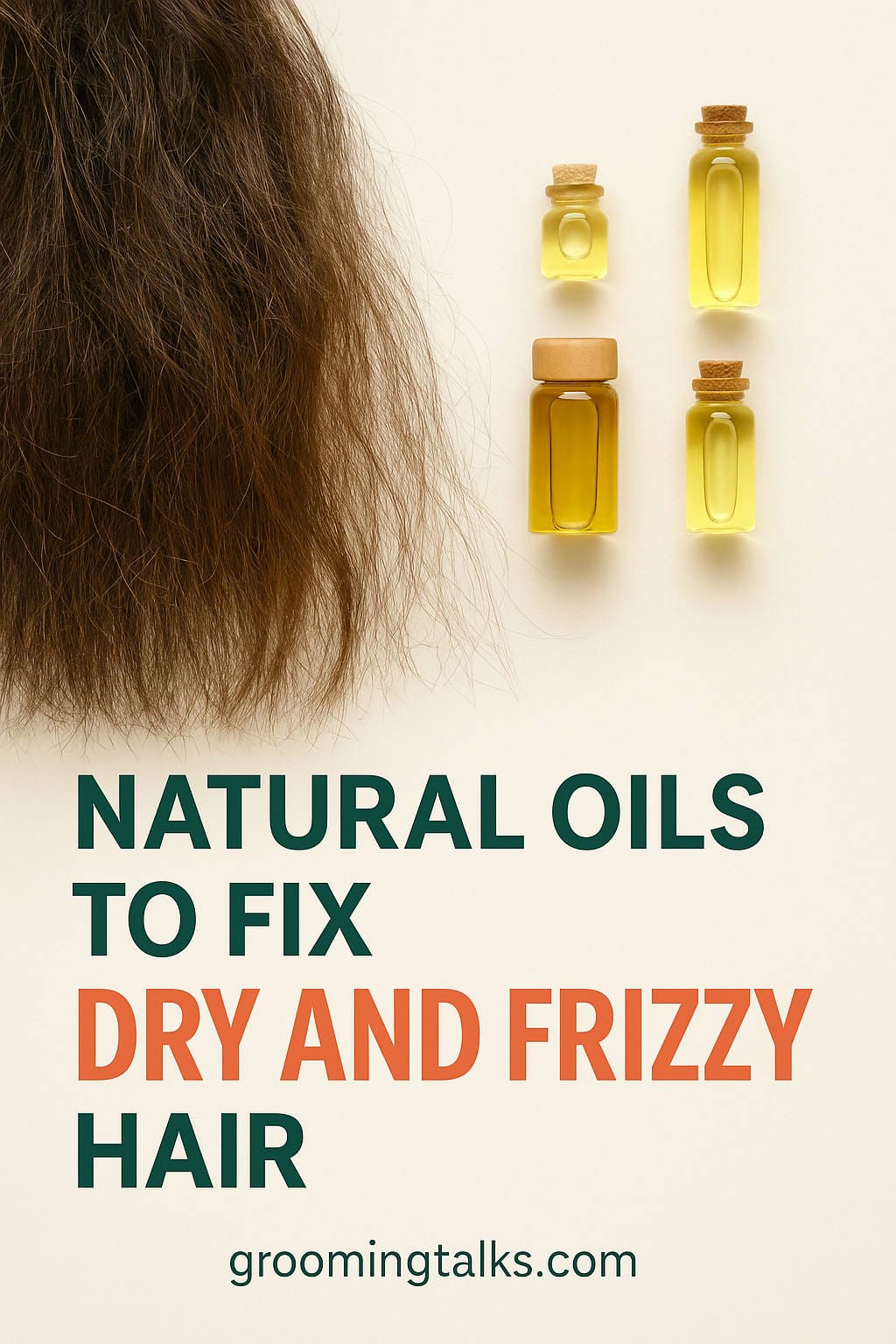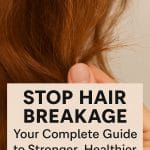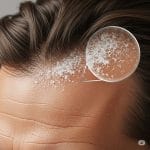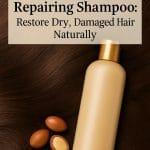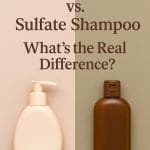If you’re tired of battling dry, frizzy hair every morning, you’re not alone. Many of us have looked in the mirror only to see flyaways, dull strands, or hair that just won’t cooperate. Frizz and dryness are incredibly common, but here’s the good news—you don’t need expensive products or salon treatments to bring your hair back to life.
Nature has already provided us with an arsenal of ingredients and techniques to restore moisture, smooth out frizz, and bring softness and shine back to our hair—all without chemicals.
In this guide, we’re diving deep into the causes of dry and frizzy hair and sharing natural, easy-to-follow remedies that actually work. Whether your hair is curly, straight, thick, or fine, you’ll find something here to help you regain control and confidence.
What Causes Dry and Frizzy Hair?
Before you can treat the problem, it’s essential to understand what’s causing it. Dry and frizzy hair doesn’t just happen out of nowhere—usually, it’s a result of one or more of the following factors:
- Lack of moisture: When your hair is thirsty, it becomes brittle, dull, and frizzy.
- Heat styling: Regular use of flat irons, curling wands, and blow dryers can strip your hair of its natural oils.
- Chemical treatments: Hair coloring, bleaching, perming, and relaxing weaken the structure of your hair and dry it out over time.
- Environmental exposure: Sun, wind, humidity, and pollution all contribute to damage and dehydration.
- Overwashing: Washing your hair too often—especially with harsh shampoos—can strip away the natural oils that keep it soft and healthy.
- Wrong hair care routine: Using alcohol-heavy products, brushing wet hair aggressively, or skipping conditioner all take a toll on your hair’s health.
- Poor nutrition or dehydration: Your hair reflects your internal health. A lack of essential nutrients or water can directly impact its texture and strength.
When you fix the root cause, frizz becomes much easier to manage.
What Frizzy Hair Really Needs
At its core, frizzy hair is crying out for moisture and protection. The cuticle (the outermost layer of the hair) opens up when it’s dry, letting moisture from the air in—which swells the strand and creates that puffy, frizzy look.
The solution? You need to smooth the cuticle, lock in moisture, and minimize damage going forward.
Natural Daily Hair Care Routine for Frizz Control
Before trying any DIY masks or oils, it’s important to set a strong foundation with your daily routine. Small changes can make a massive difference in how your hair behaves.
1. Choose the Right Shampoo and Conditioner
Use a sulfate-free, moisturizing shampoo. Sulfates may create a rich lather, but they also strip natural oils. Look for shampoos with ingredients like aloe vera, argan oil, coconut milk, or shea butter.
Conditioner is non-negotiable. Apply it generously, especially to the mid-lengths and ends of your hair. Leave it in for 2–5 minutes before rinsing.
2. Don’t Wash Your Hair Every Day
Washing your hair too frequently can dry it out. Try limiting washes to 2–3 times per week. On non-wash days, you can refresh your hair using a water spray mixed with a few drops of leave-in conditioner.
3. Use Lukewarm Water
Hot water can damage and dry out the hair. Use lukewarm or even cool water to wash and rinse—especially when rinsing out conditioner. A cold water rinse helps seal the cuticle and adds shine.
4. Dry Gently
Ditch the rough towel-drying method. Instead, pat your hair gently with a microfiber towel or a soft cotton t-shirt. Avoid rubbing—it causes frizz and breakage.
5. Detangle Smartly
Always use a wide-tooth comb or your fingers to detangle hair, especially when it’s wet. Start from the ends and work your way up. Never yank or force a knot out.
6. Protect While You Sleep
Friction from your pillow can cause breakage and frizz. Use a silk or satin pillowcase or wrap your hair in a silk scarf. This not only prevents frizz but also helps retain moisture overnight.
The Best Natural Oils for Dry and Frizzy Hair
One of the easiest and most effective ways to nourish and repair dry hair is with natural oils. They penetrate the hair shaft, protect the cuticle, and restore lost moisture.
Coconut Oil
Rich in fatty acids, coconut oil helps reduce protein loss and smooth the hair. Use it as a pre-wash treatment or leave it on overnight for deep conditioning.
How to use:
Warm 1–2 tablespoons of virgin coconut oil. Apply from scalp to ends, wrap your hair, and leave it for an hour or overnight. Shampoo as usual.
Argan Oil
Often referred to as “liquid gold,” argan oil is loaded with Vitamin E and antioxidants. It helps tame frizz and adds a glossy finish.
How to use:
Apply a few drops to damp or dry hair, focusing on the ends.
Jojoba Oil
Jojoba oil is structurally similar to the natural oil (sebum) your scalp produces, making it great for moisturizing without being too heavy.
How to use:
Mix with a few drops of essential oil like lavender or rosemary and massage into your scalp and hair.
Castor Oil
Thicker and more intense, castor oil is amazing for deep repair and hair growth. Use sparingly—its density can weigh hair down.
How to use:
Combine with lighter oils like coconut or olive oil to dilute before applying.
Olive Oil
Extra virgin olive oil is excellent for dry, coarse hair. It adds softness and shine while protecting from further damage.
Homemade Hair Masks That Actually Work
Hair masks are a powerful way to deliver deep moisture and nutrients to your hair. Here are some tried-and-true natural recipes you can whip up in your kitchen:
1. Banana + Honey + Coconut Oil
Bananas are rich in potassium and silica, which help soften and strengthen hair. Honey is a natural humectant that draws moisture into your strands.
What you need:
- 1 ripe banana
- 1 tablespoon honey
- 2 tablespoons coconut oil
How to use:
Blend all ingredients until smooth. Apply from roots to ends, cover with a shower cap, and leave it on for 30–45 minutes. Rinse and shampoo.
2. Avocado + Olive Oil + Yogurt
Avocados contain healthy fats and vitamins A, D, and E, making them perfect for deep conditioning.
What you need:
- 1 ripe avocado
- 2 tablespoons olive oil
- 2 tablespoons plain yogurt
How to use:
Mash everything together until creamy. Apply to damp hair, leave for 30–40 minutes, then rinse well.
3. Aloe Vera + Castor Oil
Aloe vera soothes the scalp, repairs damaged cells, and hydrates. Castor oil adds strength and moisture.
What you need:
- 2 tablespoons aloe vera gel
- 1 tablespoon castor oil
How to use:
Mix and apply to your scalp and hair. Leave for at least 1 hour, then shampoo out.
4. Egg + Honey + Olive Oil
Eggs provide protein that strengthens and repairs damaged hair, while honey and olive oil add intense hydration.
What you need:
- 1 egg
- 1 tablespoon honey
- 2 tablespoons olive oil
How to use:
Whisk all ingredients, apply to hair, and let sit for 30 minutes. Use cool water to rinse (hot water can cook the egg!).
Extra Tips for Naturally Healthy Hair
Dry and frizzy hair isn’t just about what you put on your hair—it’s also about your lifestyle, habits, and nutrition. Here are some extra tips to support healthy hair from the inside out:
Stay Hydrated
Your hair needs water just like your body does. Aim for 8–10 glasses of water a day to keep your strands hydrated from the inside.
Eat a Hair-Friendly Diet
What you eat has a big impact on your hair. Include these nutrient-rich foods in your diet:
- Protein: Eggs, nuts, lentils, and chicken
- Omega-3 fatty acids: Salmon, chia seeds, flaxseeds
- Biotin: Sweet potatoes, spinach, almonds
- Iron and Zinc: Beans, leafy greens, pumpkin seeds
- Vitamin C: Citrus fruits, berries, bell peppers (helps in iron absorption)
Reduce Stress
Stress can lead to hair fall, poor hair texture, and even scalp issues. Regular exercise, meditation, and deep breathing can help keep your cortisol levels in check.
Trim Regularly
Trimming every 8–12 weeks prevents split ends from traveling up the strand, which keeps your hair looking healthier and more manageable.
Protect from the Elements
If you’re spending time in the sun, wind, or chlorinated water, cover your hair with a scarf, hat, or swim cap. You can also apply a small amount of leave-in conditioner or oil to shield your strands.
What to Avoid When Treating Dry and Frizzy Hair
To truly fix the issue, you’ll also need to be aware of what to avoid. Many people unknowingly worsen their hair problems by using the wrong products or habits.
Avoid Harsh Shampoos
Stay away from shampoos with sulfates, parabens, alcohol, and artificial fragrances. These ingredients strip away your natural oils and cause dryness.
Say No to Daily Heat Styling
Using flat irons, curling wands, and blow dryers every day is a surefire way to fry your hair. Limit usage to 1–2 times a week and always use a heat protectant spray.
Don’t Brush Wet Hair
Hair is most fragile when wet. Use your fingers or a wide-tooth comb, and never tug or brush harshly.
Avoid Tight Hairstyles
Tight buns, ponytails, or braids can cause breakage and stress on the scalp. Opt for loose styles, especially when your hair is already fragile.
Consistency Is the Key
One-time treatments won’t fix years of damage. Like skincare or fitness, your hair needs ongoing care and consistency to truly transform. Use natural oils regularly, indulge in weekly hair masks, avoid harmful practices, and give your hair time to respond.
Final Thoughts
Taming dry and frizzy hair doesn’t mean surrendering to a shelf full of pricey products or scheduling salon appointments every month. The most effective, long-lasting solutions are natural, simple, and often right in your kitchen.
Whether you’re applying a banana mask, switching to a silk pillowcase, or adding more water and omega-3s to your diet, each change brings you closer to the soft, shiny, healthy hair you deserve.
Be kind to your hair, and it will return the favor. Start slow, stay consistent, and trust the process. The journey to beautiful, frizz-free hair starts now—and it starts naturally.
You might also like,
- Top 18 Best Shampoos for Dry Hair 2025: Restore Moisture & Shine
- Top 10 Natural Conditioners to Pair with Argan Oil Shampoo for Healthy Hair
- Best Shampoos for Damaged Hair in 2025 | Restore & Repair with Top Expert Picks
